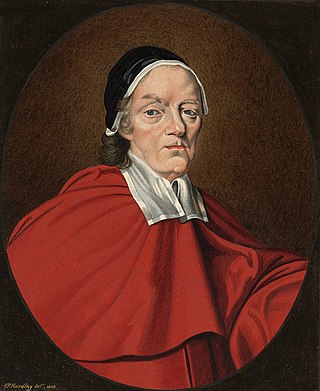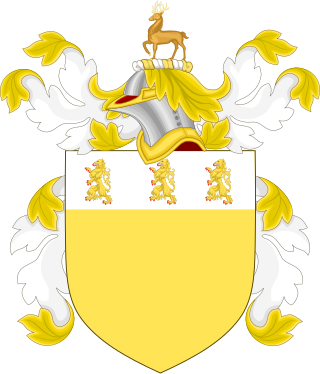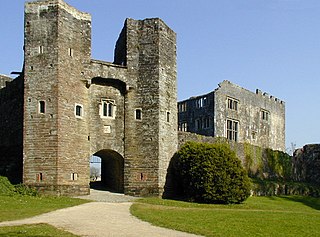Related Research Articles

The Long Parliament was an English Parliament which lasted from 1640 until 1660. It followed the fiasco of the Short Parliament, which had convened for only three weeks during the spring of 1640 after an 11-year parliamentary absence. In September 1640, King Charles I issued writs summoning a parliament to convene on 3 November 1640. He intended it to pass financial bills, a step made necessary by the costs of the Bishops' Wars in Scotland. The Long Parliament received its name from the fact that, by Act of Parliament, it stipulated it could be dissolved only with agreement of the members; and those members did not agree to its dissolution until 16 March 1660, after the English Civil War and near the close of the Interregnum.

Sir Oliver St John was an English judge and politician who sat in the House of Commons from 1640-53. He supported the Parliamentary cause in the English Civil War.

Sir Orlando Bridgeman, 1st Baronet, SL was an English common law jurist, lawyer, and politician who sat in the House of Commons from 1640 to 1642. He supported the Royalist cause in the Civil War.

John Finch, 1st Baron Finch was an English judge, and politician who sat in the House of Commons at various times between 1621 and 1629. He was Speaker of the House of Commons.

Sir John Bramston the elder was an English judge and Chief Justice of the King's Bench.
Peregrine Hoby, was an English landowner and member of parliament who sat in the House of Commons at various times between 1640 and 1679.

Sir John Maynard KS was an English lawyer and politician, prominent under the reigns of Charles I, the Commonwealth, Charles II, James II and William III.

William Heveningham (1604–1678) was an English politician who sat in the House of Commons from 1640 to 1653. He supported the Parliamentary cause in the English Civil War and was one of the Regicides of Charles I of England.

Sir John Lisle was an English lawyer and politician who sat in the House of Commons at various times between 1640 and 1659. He supported the Parliamentarian cause in the English Civil War and was one of the regicides of King Charles I of England. He was assassinated by an agent of the crown while in exile in Switzerland.

Sir Edward Seymour, 3rd Baronet of Berry Pomeroy Castle was an English politician who sat in the House of Commons at various times between 1640 and 1688. He fought for the Royalist cause in the English Civil War.
Sir John Bramston, the younger, was an English lawyer and politician who sat in the House of Commons from 1660 to 1679. The son of Sir John Bramston, the elder and his first wife Bridget Moundeford, daughter of Thomas Moundeford, he was educated at Wadham College, Oxford, and called to bar at Middle Temple in 1635. In 1660 he was elected to the Convention Parliament for the county of Essex and again in the Cavalier Parliament of 1661. He frequently acted as chairman of committees of the whole House of Commons of England and was returned to parliament for Maldon in 1679 and 1685. He left an autobiography.
Thomas Lane was an English lawyer and politician who sat in the House of Commons variously between 1625 and 1648.
Sir Edward Master(s) (2 August 1610 – 22 January 1691) of Canterbury, Kent was an English politician who sat in the House of Commons at various times between 1640 and 1679.
Francis Bramston or Brampston was an English judge and Baron of the Exchequer.
John Nutt was an English politician who sat in the House of Commons from 1640 to 1653. He fought on the Parliamentary side in the English Civil War.
John Finch was an English politician who sat in the House of Commons at various times between 1624 and 1642.

Richard Rose was an English merchant and politician who sat in the House of Commons from 1640 to 1648.
Thomas Warmestry was Dean of Worcester from 1661 until his death.

William Laud was a bishop in the Church of England. Appointed Archbishop of Canterbury by Charles I in 1633, Laud was a key advocate of Charles I's religious reforms; he was arrested by Parliament in 1640 and executed towards the end of the First English Civil War in January 1645.
John Herne (c.1593–1649) was an English barrister, involved in high-profile trials of the 1630s and 1640s.
References
- 1 2 Students admitted to the Inner Temple 1571-1625
- ↑ Willis, Browne (1750). Notitia Parliamentaria, Part II: A Series or Lists of the Representatives in the several Parliaments held from the Reformation 1541, to the Restoration 1660 ... London. pp. 229–239.
- ↑ National Archives - Prerogative Court of Canterbury wills (1384 - 1858)
- ↑ John Burke A genealogical and heraldic history of the commoners of Great Britain, Volume 2